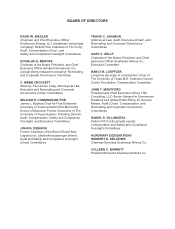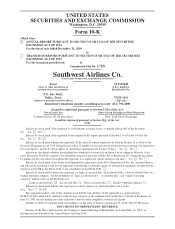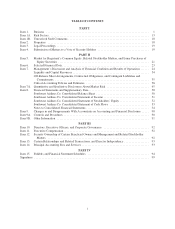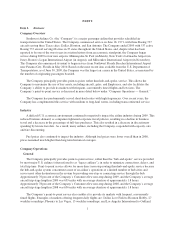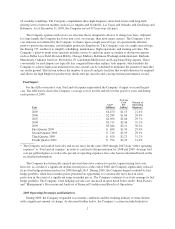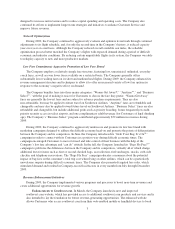Southwest Airlines 2009 Annual Report Download - page 16
Download and view the complete annual report
Please find page 16 of the 2009 Southwest Airlines annual report below. You can navigate through the pages in the report by either clicking on the pages listed below, or by using the keyword search tool below to find specific information within the annual report.not market service to or from Dallas Love Field and any point outside of a Wright Amendment State. In
other words, a Customer could not purchase a single ticket between Dallas Love Field and any destination
other than a Wright Amendment State. The Wright Amendment did not restrict flights operated with aircraft
having 56 or fewer passenger seats, nor did it restrict the Company’s intrastate Texas flights or its air
service to or from points other than Dallas Love Field. In 2006, the Company entered into an agreement
with the City of Dallas, the City of Fort Worth, American Airlines, Inc., and the DFW International Airport
Board, pursuant to which the five parties sought enactment of legislation to amend the Wright Amendment.
Congress responded by passing the Wright Amendment Reform Act of 2006, which immediately repealed
the original through service and ticketing restrictions by allowing the purchase of a single ticket between
Dallas Love Field and any U.S. destination (while still requiring the Customer to make a stop in a Wright
Amendment State), and reduced the maximum number of gates available for commercial air service at
Dallas Love Field from 32 to 20. The Company currently uses 15 gates at Dallas Love Field. Pursuant to the
Wright Amendment Reform Act and local agreements with the City of Dallas with respect to gates, the
Company can expand scheduled service from Dallas Love Field and currently intends to do so. The Wright
Amendment Reform Act also provides for substantial repeal of the remainder of the Wright Amendment in
2014.
Safety and Health Regulation
The Company and its third-party maintenance providers are subject to the jurisdiction of the FAA with respect
to the Company’s aircraft maintenance and operations, including equipment, ground facilities, dispatch,
communications, flight training personnel, and other matters affecting air safety. To ensure compliance with its
regulations, the FAA requires airlines to obtain, and the Company has obtained, operating, airworthiness, and other
certificates. These certificates are subject to suspension or revocation for cause. In addition, pursuant to FAA
regulations, the Company has established, and the FAA has approved, the Company’s operations specifications and
a maintenance program for the Company’s aircraft, ranging from frequent routine inspections to major overhauls.
The FAA, acting through its own powers or through the appropriate U.S. Attorney, also has the power to bring
proceedings for the imposition and collection of fines for violation of the Federal Aviation Regulations.
The Company is subject to various other federal, state, and local laws and regulations relating to
occupational safety and health, including Occupational Safety and Health Administration and Food and Drug
Administration regulations.
Security Regulation
Pursuant to the Aviation and Transportation Security Act (the “Aviation Security Act”), the Transportation
Security Administration (the “TSA”), a division of the U.S. Department of Homeland Security is responsible for
certain civil aviation security matters. The Aviation Security Act addresses procedures for, among other things,
flight deck security, the use of federal air marshals onboard flights, airport perimeter access security, airline crew
security training, security screening of passengers, baggage, cargo, mail, employees, and vendors, training and
qualifications of security screening personnel, provision of passenger data to U.S. Customs and Border Protection,
and background checks. Under the Aviation Security Act, substantially all security screeners at airports are federal
employees, and significant other elements of airline and airport security are overseen and performed by federal
employees, including federal security managers, federal law enforcement officers, and federal air marshals.
TSA-mandated security procedures can have a negative effect on the Customer experience and the
Company’s operations. For example, in 2006, the TSA implemented security measures regulating the types of
liquid items that can be carried onboard aircraft. In 2009, the TSA introduced its Secure Flight Initiative. As part
of that initiative, the Company has begun collecting additional Customer data. The Secure Flight Initiative was
created to help reduce the number of passengers who are misidentified as possible terrorists because their names
are similar to those of people on security watch lists. The program standardized how names are matched, as well
as added age and gender to a passenger’s profile. Under the program, the Company is required to ask for
8


